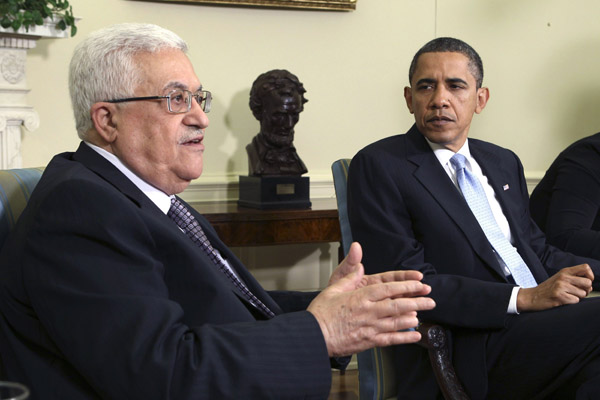Obama reaffirms support for Abbas
U.S. President Barack Obama on Wednesday announced a 400-million-dollar humanitarian aid for the West Bank and Gaza Strip, in a highlighted support for Palestinian National Authority (PNA) and its leader Mahmoud Abbas.
 |
|
U.S. President Barack Obama welcomes Palestinian President Mahmoud Abbas (L) to the White House in Washington, June 9, 2010. Obama hosted Abbas at the White House on Wednesday seeking to ensure that fallout from Israel's Gaza flotilla raid does not derail fragile U.S.-led peace efforts. [Xinhua/Reuters Photo] |
After his meeting with PNA Chairman Abbas at the White House, President Obama announced the aid, which is obviously aimed at strengthening the leadership of the Abbas-led PNA in Palestinian territories, namely the West Bank and Gaza Strip.
A White House statement said that the aid, in initiatives and commitments, will help "increase access to clean drinking water, create jobs, build schools, expand the availability of affordable housing, and address critical health and infrastructure needs."
The Obama administration, who viewed the PNA as "a reliable partner for peace", called for the international community to offer support for the authority, saying the international support is "critical" for the Palestinian people, for the future of a Palestinian state, for the future security of Israel and for the region.
Chairman Abbas, backed by the United States, dissolved the unity government comprised the radical Islamic Resistance Movement, or Hamas, and his own Fatah party in June 2008 and named Salam Fayyad as prime minister in the new government, which conducts governance only in the West Bank.
The Gaza Strip, however, is under the de facto control by the Islamic Hamas movement.
Hamas, who has repeatedly vowed to destroy Israel, denied the legitimacy of any new Palestinian government without the approval of the Palestinian Legislative Council (PLC). It took control of the PLC when it overwhelmingly won parliamentary elections in March 2007.
Regarding Hamas as a terrorist group, the United States had cut off all contacts and aid to the Hamas-dominated unity government.
As to Abbas' concern over Jewish settlement activities in the West Bank, Obama called on both sides to take concrete measures to ensure that the proximity talks could be transitioned to the direct talks and that "significant progress" could be made within this year.
The president clearly called on the Israeli government to curb the settlement activities and find out a solution to ease up the humanitarian crisis in the Hamas-controlled Gaza Strip.
Under the pressure mounted by the Obama administration, the Israeli government and the PNA resumed their talks early this month, although in an indirect way mediated by U.S. special envoy George Mitchell, ending a 17-month-long stalemate.
Obama has urged both sides to resume direct talks in order to reach a permanent agreement that leads to the establishment of an independent Palestinian state. But the two sides refused the call because of dispute over Jewish settlement expansion in the West Bank and East Jerusalem.
Chairman Abbas insists that the talks shall not resume until the Israeli government totally freezes the Jewish settlement construction in the West Bank, while the Israeli side blames Abbas of setting condition for resuming the talks and vows to ensure the "natural growth" of the Jewish settlements.
At least 450,000 Israelis live in more than 100 settlements in the West Bank and East Jerusalem.
 0
0 






